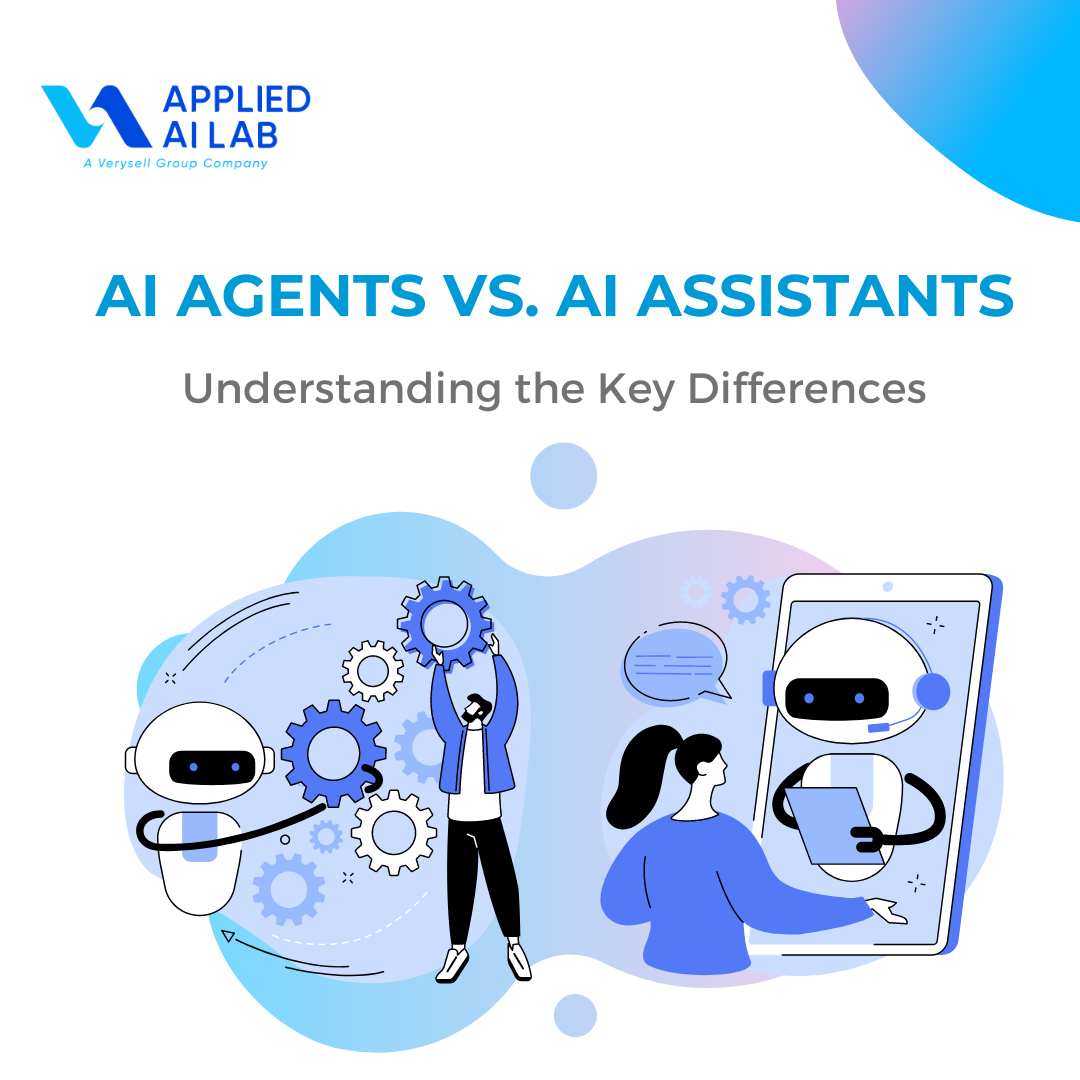The terms AI agents and AI assistants are often used, but they represent distinct concepts with unique functionalities and applications. Understanding the differences between AI agents vs. AI assistants can help businesses make informed decisions about which technology best suits their needs. At Verysell Applied AI Lab, we specialize in developing AI solutions that enhance operational efficiency and customer experience. This article will explore the characteristics, use cases, and differences between AI agents and AI assistants.
What Are AI Agents and AI Assistants?
AI Agents
AI agents are autonomous software programs designed to perform specific tasks by perceiving their environment, processing information, and taking actions to achieve defined goals. To learn more about what are AI Agents, check out our latest blog post on: Understanding AI Agents: The Future of Intelligent Automation
AI Assistants
On the other hand, AI assistants are user-facing applications that help individuals with routine tasks through conversational interfaces. Examples include popular virtual assistants like Siri, Alexa, and Google Assistant. These systems excel in natural language processing (NLP) to understand user queries and provide relevant information or perform simple tasks like setting reminders or managing schedules.
Key Differences Between AI Agents and AI Assistants
- Autonomy
- AI Agents: Operate autonomously, capable of making decisions and taking actions without human input. They analyze complex datasets to achieve specific goals.
- AI Assistants: Primarily assist users by responding to commands or queries. They require user interaction to perform tasks and do not operate independently.
- Complexity of Tasks
- AI Agents: Designed for complex problem-solving and decision-making tasks that often involve multiple variables and real-time data analysis.
- AI Assistants: Focus on simpler tasks such as answering questions, managing schedules, or providing information based on user requests.
- Interaction Style
- AI Agents: Often work in the background within specific systems or applications, automating processes without direct user interaction.
- AI Assistants: Engage directly with users through voice or text interfaces, providing a more interactive experience.
- Learning Capabilities
- AI Agents: Utilize machine learning algorithms to adapt and improve their performance over time based on interactions with their environment.
- AI Assistants: Have limited learning capabilities primarily focused on enhancing user interaction rather than adapting to complex scenarios.
Use Cases for AI Agents and AI Assistants
Use Cases for AI Agents
- Healthcare Diagnostics: AI agents analyze patient data to assist doctors in diagnosing diseases more accurately. Learn more about how EHR Enhancement support in the healthcare sector in this article.
- Supply Chain Management: They optimize inventory levels by predicting demand fluctuations based on historical data.
- Fraud Detection: Financial institutions use AI agents to monitor transactions in real-time and flag suspicious activities.
Use Cases for AI Assistants
- Personal Scheduling: Virtual assistants help users manage calendars by scheduling meetings and sending reminders.
- Customer Support: Chatbots serve as first-line support agents, answering frequently asked questions and directing customers to appropriate resources.
- Information Retrieval: Users can ask AI assistants for quick information, such as weather updates or news summaries.
The Role of Verysell Applied AI Lab
At Verysell Applied AI Lab, we specialize in developing tailored solutions that leverage both AI agents and AI assistants across various industries such as banking, telecommunications, manufacturing, and retail. Our mission is to empower businesses by providing cutting-edge technologies that enhance operational efficiency while improving customer experiences.
Our Expertise Includes:
- Natural Language Processing (NLP): Enabling our systems to understand and respond effectively to human language for both agents and assistants.
- Data Analytics: Transforming raw data into actionable insights that inform strategic decision-making.
- Custom Development: Creating bespoke solutions that integrate seamlessly into existing workflows to maximize productivity.
We believe that “AI doesn’t replace humans; those using AI do.” Our approach emphasizes collaboration between human intelligence and artificial intelligence, ensuring that businesses can leverage technology without losing the human touch.
Conclusion
Understanding the differences between AI agents vs. AI assistants is crucial for businesses looking to implement these technologies effectively. While both play significant roles in enhancing productivity and efficiency, they serve different purposes within an organization.
To learn more about how Verysell Applied AI Lab can assist you in integrating these technologies into your operations effectively, check out our latest posts on overcoming challenges when integrating AI agents. Embracing these advancements will be essential as we move toward a future where intelligent automation significantly impacts business success.


